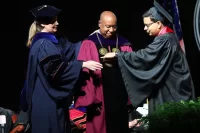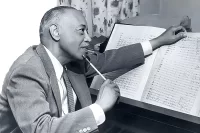Activist revisits civil rights work in autobiographical play
During the civil rights movement of the 1960s, John Perdew dropped out of Harvard in order to fight for the equal rights of all Americans. Some 40 years later, he turned his story into The Education of a Harvard Guy, a play that he performs at Bates College at 7 p.m. Monday, Nov. 1, in Chase Hall Lounge, 56 Campus Ave.
Rutha Mae Harris, a founding member of The Freedom Singers, sings songs associated with the civil rights movement during the performance. In the panel presentation Leaving College for Good, which follows Perdew and Harris, students who have taken a break from Bates to do good works will discuss their projects and what it means for them to serve.
The event is open to the public at no cost. Sponsored by the Multifaith Chaplaincy, it is the 2010 Bertha May Bell Andrews Lecture at Bates. For more information, call 207-786-8272.
After leaving Harvard, Perdew joined the Student Nonviolent Coordinating Committee (SNCC) and worked in the committee’s southwest Georgia office. Eventually he, along with three other young men, was detained in Americus, Ga., and charged under the state’s 1871 Anti-Treason Act, created to suppress black resistance to white rule.
Because this crime was punishable by execution, the men were not offered bail and remained in jail for nearly four months awaiting trial. The case was eventually dismissed, and the men became known as “The Americus Four.” Perdew created Education of a Harvard Guy in 2005 with the help of playwright Curtis L. Williams.
The Freedom Singers formed in 1962 in Albany, Ga. They traveled across the country to raise money for SNCC and inform audiences about the grassroots organizing campaigns taking shape across the South.
A signature talk at Bates since 1975, the Andrews Lecture is a memorial to Bertha May Bell Andrews, who served on the Bates faculty from 1913 to 1917 and established the women’s physical education program at the college. Her son, Dr. Carl B. Andrews of the Bates class of 1940, established the lectureship.


